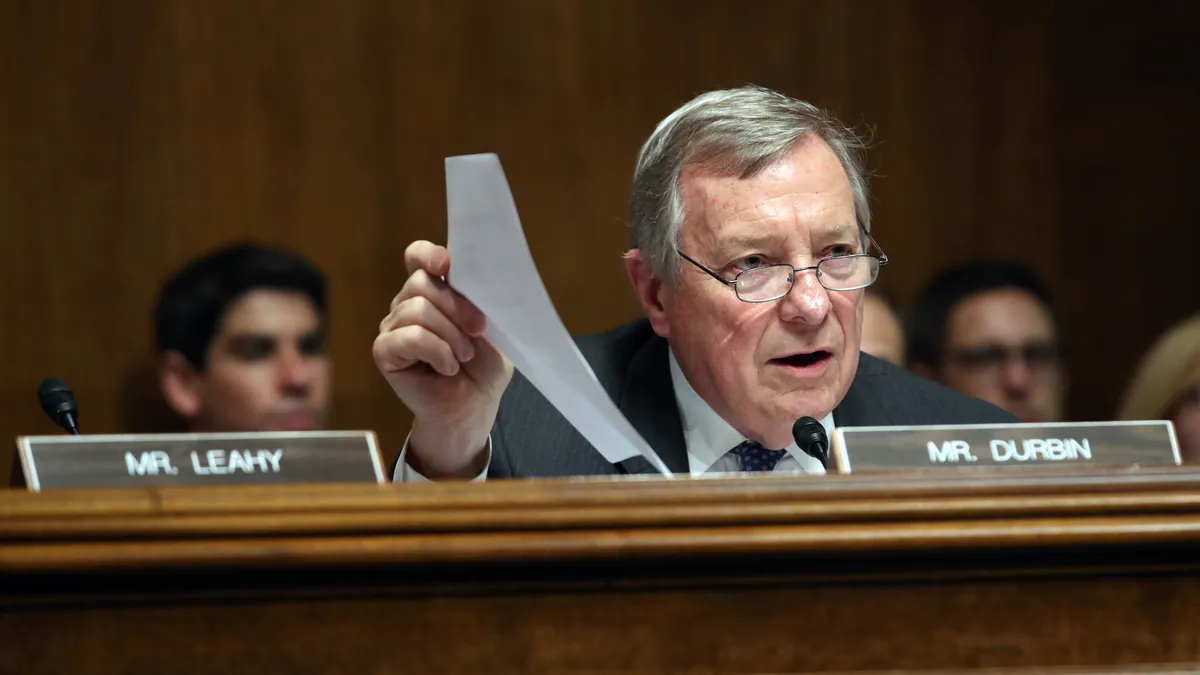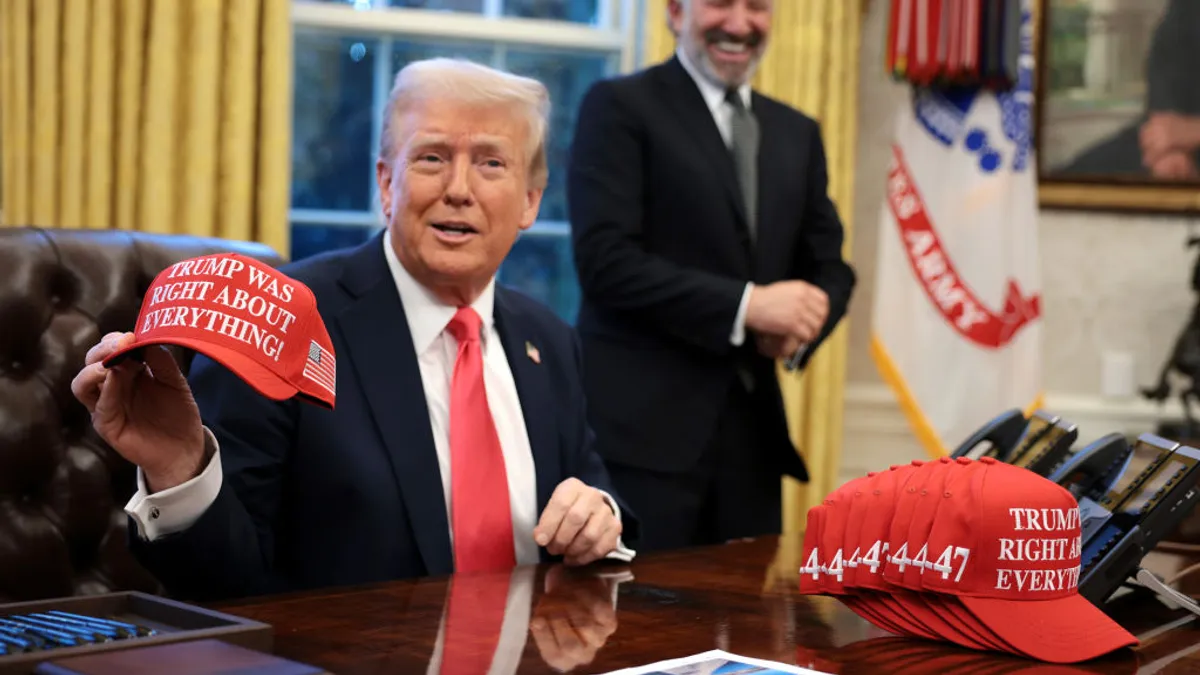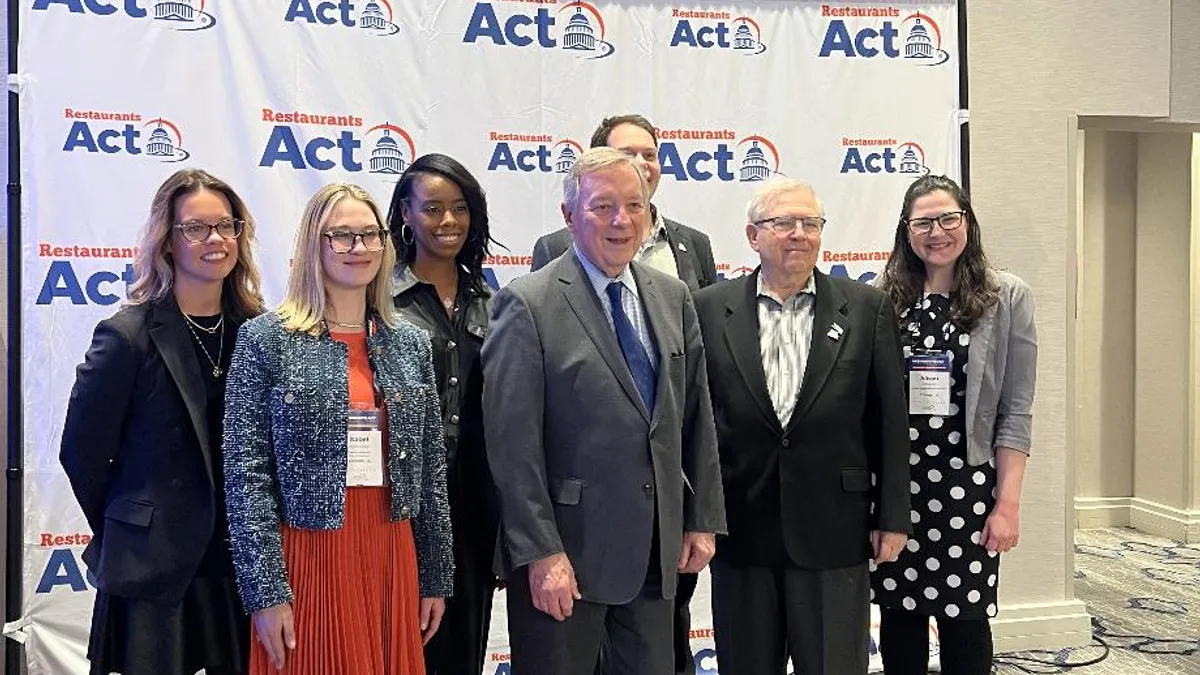U.S. Sen. Dick Durbin proposed new measures to rein in card network companies’ interchange, or "swipe" fees, at a congressional hearing Wednesday, but his proposals fell short of the credit card fee cap that some organizations feared might be in the offing.
The two big card network companies, Visa, which dominates the industry, and No. 2 Mastercard, were in the hot seat at that Senate Judiciary Committee hearing on “excessive swipe fees and barriers to competition in the debit and credit card systems."
Durbin, who chairs the committee, chided the card network companies over April fee increases that he said contributed to inflationary pressures. The Illinois Democrat also expressed his displeasure at their imposing fee increases despite a bipartisan letter last month that he and other congressional members sent to the card networks in a bid to persuade them to hold off on fee hikes this year.
As a long-time nemesis of the card network companies, Durbin routinely refers to Visa and Mastercard as a “duopoly” and calls for more restraint of their card businesses. He began his crusade against the network companies more than a decade ago as the author of an amendment to the 2010 Dodd-Frank Wall Street Reform and Consumer Protection Act that capped debit fees.
“The credit and debit card systems are not competitive marketplaces,” Durbin declared at the hearing, which his office said was the first focused on the topic since 2006. “When you don't have real competition, what happens? You get higher costs, less innovation, weaker security, and new potential competitors get stifled. It's a sweetheart deal for the dominant networks, for the biggest banks and for certain cardholders, who have ritzy rewards programs. But the average small business and the consumer – they pay the price.”
At the hearing, the senator suggested that the bank card issuers be required to disclose the interchange fees for merchants in monthly cardholder statements to show consumers the amounts their favorite establishments are being charged, with the notion that they might consider alternatives to the cards. He also proposed that the card companies stop charging fees on the sales tax portion of a transaction and that they end their “exclusivity deals” under which Visa and Mastercard tell banks they can’t use other networks.
In addition, he urged reforms that would give merchants options in choosing card networks for each swipe and that an entity other than the dominant card networks play a role in setting security standards for cards. Finally, he stressed his core point at the hearing: Find a way to reduce inflationary pressures by keeping the fees from “being jacked up to unreasonable levels.”
Executives from Visa and Mastercard sat alongside representatives from the National Association of Convenience Stores, consumer watchdog group U.S. PIRG, Commerce Bancshares, and the Giant Eagle grocery store chain at a witness table at the hearing.
Visa’s Bill Sheedy, senior advisor to Chairman and CEO Al Kelly, maintained under questioning at the hearing that his company hadn’t raised interchange fees, despite testimony to the contrary from another panelist, Giant Eagle CEO Laura Shapira Karet. She said her company on April 22 absorbed a fee increase by the card network companies that will cost Giant Eagle $1.3 million annually.
Sheedy and Mastercards’s North America president, Linda Kirkpatrick, contended that the current fees are justified by the services their companies provide, namely assurance for merchants that they will be paid regardless of cardholders’ defaults and protections for consumers in the event of fraud. They also argued that the industry has never been more competitive, with digital wallets, buy now-pay later upstarts, crypto companies and other fintechs challenging their businesses.
Kirkpatrick said it would be contrary to her company’s interests not to set rates at levels that promoted more revenue-generating transactions. “We are incentivized to create balance across all stakeholders, both merchants and banks,” Kirkpatrick said. “If we set interchange rates too high, merchants won't accept. If set we set interchange rates too low, banks won’t issue.”
Debit card fees are limited, courtesy of the Durbin Amendment, but there are no restrictions on credit card fees. The average credit card fee imposed by Visa and Mastercard last year was 2.22% while their average debit card fee was .72%, according to an April report from card industry research firm The Nilson Report.
Visa and Mastercard pitch the interchange rates to banks that issue the cards in an effort to win them as clients for their networks, and the banks take the lion’s share of the interchange fee revenue.
Proponents of more restrictions on the fees said that they’re typically merchants’ second- or third-biggest expense item after labor costs and rent.
U.S. merchants paid $105.23 billion in fees to accept credit cards last year, an increase of 25.1% over 2020, The Nilson Report said. Meanwhile, fees for their acceptance of debit and prepaid cards rose 21.7% to $32.6 billion, according to the report.
Karet argued at the hearing that the card network companies have too much leeway to set fees. “Every bank that issues credit and debit cards adopted these fee increases without deviation or exception,” Karet said. “In my estimation, this cannot possibly comply with either the letter or the spirit of our nation's antitrust laws.”
Durbin was less vociferous than he had been last year at a hearing of the Judiciary Committee’s antitrust subcommittee, when he called out the absence of “policing authority” to rein in the “duopoly.” He didn’t propose capping credit card fees at the hearing as some organizations feared he might.
Ahead of the hearing, the National Association of Federally-Insured Credit Unions sent a letter to Durbin and the ranking Republican member of the Judiciary Committee, Chuck Grassley of Iowa, imploring them to steer clear of new regulations on credit cards. “Any new caps or restrictions on interchange fees would only hurt community institutions such as credit unions as well as the American consumer,” the association said in the May 3 letter. That trade group even said the Durbin Amendment should be repealed.
A loud call for reining in credit card fees came from Ed Mierzwinski, the senior director of U.S. PIRG’s federal consumer program. “There’s really nothing to restrain these networks in this market failure that we have in the card network ecosystem,” he said, urging the committee to expand on the Durbin Amendment.
He noted that the Federal Trade Commission and Justice Department have contributed to efforts to curtail abusive fee practices.
Overall, the hearing was a relatively calm affair. “It was tamer than I expected,” Bankrate Analyst Ted Rossman said by email. “The reforms that were discussed seemed to focus more on additional routing options and perhaps rolling back the latest interchange increases.”
He added: “The hearing seemed to be more of a fact-finding mission than an immediate threat of a stricter cap."
Indeed, Durbin didn’t talk of legislation with respect to his proposals. Rather, he asserted other regions of the world, from Europe to India and Canada, have beneficial restrictions on credit card fees, and the U.S. should, too.
The National Retail Federation and the Merchants Payments Coalition seemed to be wanting more definitive action when they chimed in Wednesday ahead of the hearing. “We hope this hearing will be a landmark step toward bringing about the transparency and competition that is missing from our nation’s broken payments system,” MPC Executive Committee member and National Association of Convenience Stores General Counsel Doug Kantor said in the release.
Durbin concluded the meeting saying he wished the card companies had resisted the urge to impose the latest fee increases and then talked light-heartedly of continuing to monitor the situation. “So I would say that this conversation will continue,” Durbin said. “We're going to have a hearing on this subject, at least every 16 years.”



















